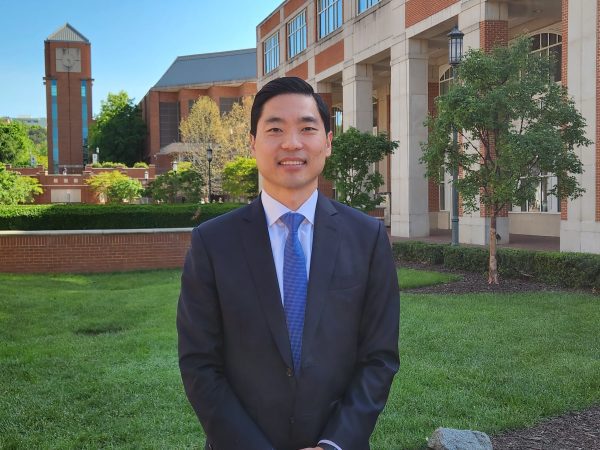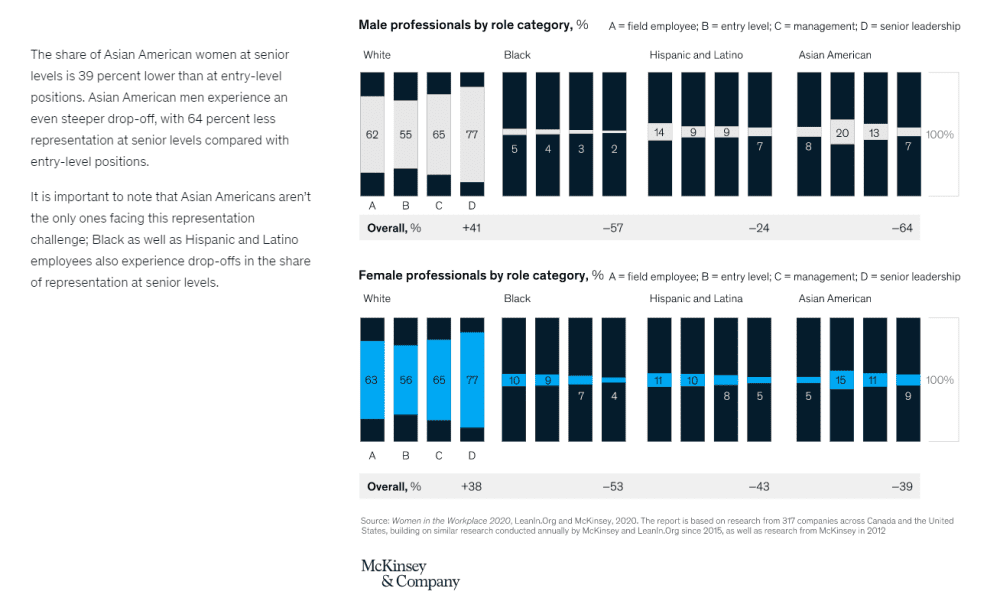Breaking Through Tradition

Mark Cho ’03 shares solutions on how Asians and other underserved students and alums can navigate the corporate ladder
Words and Photo by: Shalonna Anderson, University Communications – Alumni
“That definitely wasn’t here when I was a student,” said Mark Cho ’03, executive vice president at Martin Currie, a global investment management firm. After 20 years, Cho ventured on a guided tour around UNC Charlotte’s campus, marveling at newly constructed facilities and resources available to students. Now a resident of the Greater Washington D.C. metro area, Cho, who is Korean American, revisited the campus to participate as a panelist in the Asian American Pacific Islander Connect for Success professional development discussion that took place April 19.
Hosted by the Alumni Engagement Office and the University Career Center, the panel discussion was aimed at Asian American Pacific Islander students and alumni. It took a deep dive into the topic, Creating Community and Networking in Professional Settings, and helped prepare attendees for the workforce and to engage with it.
Cho’s willingness to travel back to Charlotte to spread awareness stems from his advocacy surrounding the importance of diverse representation in corporate America, networking, and the success of UNC Charlotte students and alumni. After progressing in his career, Cho, a graduate of the Belk College of Business, recognized the staggering number of underrepresented Asians and other people of color within specific roles in corporate industries. When he took a closer look, Cho discovered alarming statistics from McKinsey & Company, which illustrate dramatically low numbers of Asians, Asian Americans, and other people of color in leadership roles compared to whites. Numbers that have not changed in almost 20 years.


Cho believes that a part of this issue for Asian Americans is based on cultural upbringing. He says that many of the lessons he and other second and even third-generation kids learned have bled into his professional life.
“As a kid,” he said, “there are specific cultural biases. You’re taught – work hard, keep your head down, respect elders, don’t speak out…” He realized, however, that those cultural biases can make it difficult to progress in corporate America and do not guarantee career advancement. “While I was recognized for my hard work,” he said, “it was more of a pat on the back rather than it leading to advancement opportunities.” Cho challenged the traditional path, stereotypes of “the model minority,” and the “Bamboo Ceiling” by engaging in a career advancement tool often underutilized by Asians and all professionals in general: networking.
“Network, but don’t make networking transactional.”
During the panel discussion, Cho shared that within the last eight years, he’s learned that networking and finding sponsors are critical components of a successful career. He wanted to raise awareness about the cultural aspects of being an Asian American in corporate America and share that those looking to advance their careers are less likely to achieve greater success without adjusting their approach to career development.
Cho shared three keys to building a successful network, which he learned from a McKinsey Asian Leadership Executive Program:
- Your support network is something to think about strategically and in the context of your personal vision – not reactionary or transactional.
- Distinguish connecting from traditional stereotypes of “networking” – more about reciprocity and mutual support, a deeply human community-building instinct.
- You need sponsors, not just mentors, to create opportunities, help you grow, and help you navigate the landscape of your organization.
“Having mentors, advocates and a network,” said Cho, “is especially important for Asians residing in cities with a low Asian population.”
Cho recalled his time as a student at UNC Charlotte before he discovered his passion. That happened when he enrolled in Professor John Connaughton’s economics class. He later helped build a network of like-minded students, developing the Asian American Student Association, now the Asian Student Union. In addition to the friendships he formed, he reminisced on the first-ever UNC Charlotte Asian Basketball Tournament, uniting 14 Asian American teams from across the region, including teams from North Carolina State University, the University of North Carolina – Chapel Hill Virginia Commonwealth University and others.
By shining a light on topics that hinder a community and providing recommendations, Cho believes he is taking a step in giving back in a way that helps those in a community grow together. He has found a way to make a deeper impact by raising awareness of issues that may not be apparent to people within his group.
“If I can help younger generations succeed and advance in their careers by raising awareness, that’s what I would love to see,” Cho said. “I didn’t have that opportunity, and it took a while to become fully aware of the challenges my community faces.”
“Network vertically and horizontally.”
While Cho advises students and alums to network, he warns that networking is not a one-way street.
“Don’t make it all about you,” he said. “Think, ‘What can I do to help someone else?’ I’ve seen networking pay dividends over the last 10 years.”While networking is not taught at most universities and new graduates may or may not have yet mastered the skill, Cho believes students and alumni of all races should utilize networking to get ahead. “Network with people in senior management, but also with those holding junior positions,” he advises. “You never know who that person will turn out to be.”